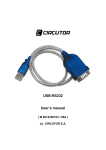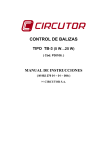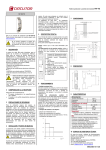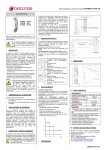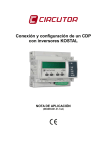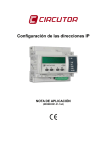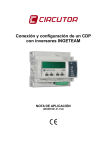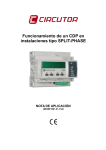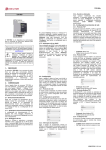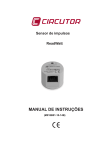Download Manual de Instrucciones Instruction Manual
Transcript
DIR2 Manual de Instrucciones Instruction Manual M98231501-20-10C REGULADOR DE ENERGÍA REACTIVA DIR2 DIR2 PF Regulator El DIR2 es un regulador de un solo paso de muy reducidas dimensiones, ideal para compensar el cos ϕ en instalaciones que requieren una regulación en un solo escalón. Puede emplearse también como complemento de un regulador de más pasos, ya sea como relé de alarma o para conectar un paso adicional. The DIR2 is a PF regulator to control a single capacitor step. The DIR2 is the ideal regulator for cos ϕ compensation in small installations where a single step regulation is required. The regulator can be also used as alarm relay in case of lack of compensation or as additional step in an existing capacitor bank. CONEXIÓN Y AJUSTES CONNECTION AND SETUP Para la conexión y puesta en marcha del relé DIR2, deben tenerse en cuenta los siguientes puntos : - El relé DIR2 requiere la instalación de un transformador de corriente eficiente de la serie MC1 (In / 0,25 A), donde In debe ser mayor que la intensidad total de los receptores instalados en la línea a compensar. - El transformador de corriente se instalará en un punto de la acometida por el que circule la totalidad de la intensidad de la línea a compensar, pero sin leer la intensidad propia del condensador (ver fig.1). - Conectar el secundario del transformador de corriente (entre borne 1S1 y borne 1S2, 2S1 ó 2S2, según el valor de primario de corriente adecuado a la máxima corriente de la instalación) en los bornes señalizados como S1 y S2 en el DIR2. - La tensión de alimentación del regulador DIR2 debe tomarse entre fases (habitualmente entre las fases L2 y L3) y debe conectarse a los bornes A1-A2. - IMPORTANTE: La fase donde está instalado el transformador de intensidad, (normalmente L1), no debe coincidir con las fases de las que se toma la tensión de alimentación (normalmente L2-L3). - La intensidad reactiva de disparo del relé se fija en el mando frontal. El relé conecta cuando la intensidad reactiva medida supera el valor marcado. Para evitar fluctuaciones en la operación, el relé desconecta cuando la intensidad reactiva medida baja por debajo del 70% de dicho valor. - Si el relé no conecta y hay carga suficiente en la instalación, revisar las conexiones, y si son correctas, probar a intercambiar entre sí las conexiones que van a los terminales S1 y S2 del DIR2. To connect the DIR2 PF regulator, the following steps must be considered: - The DIR2 regulator requires one efficient current transformer of MC1 type (In / 0.25 A). The primary current In must be greater than the maximum current expected at the load to be compensated. - The current transformer must be placed in the line supplying the load to be compensated. It must measure the load current, excluding the capacitor current (see fig. 1) - Connect the CT secondary terminals (between terminal 1S1 and terminal 1S2, 2S1 or 2S2, with the primary side value fitted to the maximum value of the current drawn by the loads) to the DIR2 terminals designated as S1-S2. - The supply voltage of the DIR2 regulator must be taken phase to phase (usually from phases L2 and L3) and connected to terminals A1-A2). - IMPORTANT: The phase where CT is placed (usually L1) must not coincide with any of the phases used for the regulator supply (usually L2 and L3) - The reactive current at which the regulator trips is set by means of the frontal knob. The output relay is activated when the measured reactive current exceeds the set value. To avoid relay flickering, the relay is deactivated when the current goes below the 70% of the set value. - If the DIR2 relay does not connect when it is expected, (considerable reactive current at the load), review the connections and check if it connects when reversing the connections of CT secondary side to S1-S2 terminals. CARACTERISTICAS TÉCNICAS / TECHNICAL CHARACTERISTICS Tensión de alimentación : Fase - Fase Frecuencia Consumo 400 V ±10% 50-60 Hz < 3 VA Circuito de intensidad Corriente nominal Sobrecarga permanente Consumo Current circuit 0,25 A c.a. / a.c. 1,2 In < 0,05 VA Corriente reactiva de disparo Margen de ajuste del disparo: C/K Retardo de conexión Tc Retardo de desconexión Tr Protección al choque eléctrico Rated current Maximum permanent overload Power consumption Reactive tripping current 0,15 ... 2 Ver ejemplo / See example 5s 2s Relé de salida Corriente térmica Ith AC11 Ie / Ue DC11 Ie / Ue Vida mecánica Vida eléctrica Condiciones ambientales Temperatura de trabajo Humedad relativa máxima sin condensación Altitud máxima de funcionamiento Otras características: Indicación de conexión: Verde: Alimentación, Rojo: Relé conectado Fijación sobre perfil Categoría de protección de la caja Peso Supply voltage : Phase to Phase Frequency Power consumption Tripping adjustment range: C/K Connection delay Tc Disconnection delay Tr Output relay 10 A 10 A / 250 V c.a. / a.c. 0,3 A / 110 V c.c. / d.c 10⋅106 maniobras / operations 10⋅104 maniobras / operations -10º a +50 ºC 95 % 2000 m (s.n.m.) / 2000 m (AMSL) LED: Verde / Rojo Green / Red LED DIN 46277 (EN 50022) IP 40 0,25 kg doble aislamiento clase II / class II double isolation Thermal current Ith AC11 Ie / Ue DC11 Ie / Ue Mechanical endurance Electrical endurance Environment conditions Working temperature Maximum relative humidity without condensation Maximum operation altitude Other characteristics Connection indication: Green : Supply, Red: Relay ON Rail fastening Enclosure protection category Weight Electric shock protection Categoría de instalación Categoria III / Category III Installation category Normas EN 61010, EN 61000-3-2, EN 61000-3-3, EN 50081-2, EN 50082-1, EN 50082-2, EN 61000-4-2, EN 61000-4-4, EN 61000-4-8, EN 61000-4-5, EN 61000-4-11, UL 94 Standards EJEMPLO AJUSTE VALOR C/K C/K = EXAMPLE C/K VALUE SETUP Ic K C/K = Ic K Ic = Corriente nominal del condensador Ic = Nominal current of the capacitor K = (Corriente de primario del TC) / 5 K = (Primary current of the CT) / 5 Ejemplo: Example: 150 TC = 150/0,25 A ; K = = 30 5 CT = 150/0.25 A ; K = Condensador: 25 kvar / 440 V 150 = 30 5 Capacitor: 25 kvar / 440 V 25000 Ic 32,8 IC = = 32,8 A ; C/K = = = 1.1 1,73 × 440 K 30 IC = 25000 Ic 32,8 = 32,8 A ; C/K = = = 1.1 1,73 × 440 K 30 DIMENSIONES / DIMENSIONS TERMINALES Y CONEXIÓN / TERMINALS AND WIRING TC/CT (…/250 mA) 73 L1 35 L2 CARGAS L3 LOADS 68 A2 0, 5 A1 67 S2 0,1 5 85 S1 45 N DIR2 C/K 1 2 16 1, 5 15 18 Fig. 1. Colocación del TC y conexión del DIR2 CT placement and DIR2 connections ¡PELIGRO RIESGO ELÉCTRICO! ELECTRIC SHOCK HAZARD! Una conexión incorrecta del equipo puede producir la muerte, lesiones graves y riesgo de incendio. Cualquier manipulación de este equipo debe ser realizada por personal cualificado, y cumpliendo estrictamente todas las normativas vigentes sobre seguridad. Si el equipo es utilizado de una manera que no esté especificado por el fabricante, la protección asegurada por el equipo, puede verse comprometida. El equipo debe estar provisto de interruptor magneto-térmico o equivalente para desconectarlo. De igual forma deberá estar provisto de fusibles tipo gl (IEC 269) o tipo M de entre 0,5 y 2 A. El circuito de alimentación del equipo se conectará con cable de sección mínima 1.5 mm2. Death, serious injury, or fire hazard could result from improper connection of this instrument. Installation, operation, and maintenance of this instrument must be performed by qualified personnel only. If the equipment is handled in a way not specified by the manufacturer, the equipment's protection may be compromised. Servicio Técnico Technical Service En caso de cualquier duda de funcionamiento o avería del equipo consulte www.circutor.es o avisar al servicio técnico de Circutor S.A Vial Sant Jordi, s/n 08232 - Viladecavalls tel - 93 745 29 00 & fax - 93 745 29 14 E-mail : [email protected] For any inquiry or in case of malfunction, see www.circutor.es or contact with technical service of Circutor S.A Vial Sant Jordi, s/n 08232 - Viladecavalls (SPAIN) Telephone: + 34 93 7452900 FAX: + 34 93 7452914 E-mail : [email protected] The device has to be provided with a miniature circuit breaker to be disconnected. The fuses has to be type gl (IEC 269) or type M between 0.5 to 2 A. The power supply circuit will be connected with a wire with a minimum cross-section of 1.5 mm2.


